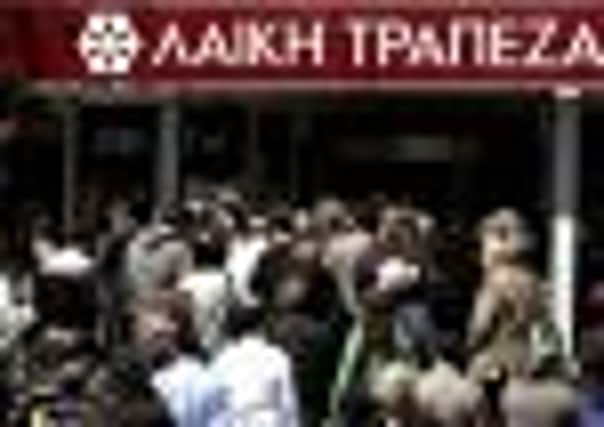Cyprus financial crisis: Banks reopen to customers


Tight capital controls are in place to prevent money flooding out of the stricken island nation and cash withdrawals are limited to €300 (£250) a day.
Armoured lorries carrying billions of euro in banknotes replenished banks on Wednesday night, with police cars escorting the cash convoy and a helicopter clattering overhead.
Advertisement
Hide AdAdvertisement
Hide AdThere were heightened security measures at banks, which urged customers not to vent their frustrations against hapless tellers, many of whom fear losing their jobs.


Despite the uncertainty caused by a controversial €10 billion bailout deal agreed with Brussels on Monday, the banks’ reopening yesterday passed remarkably smoothly.
President Nicos Anastasiades, a right-winger in power for just a month, expressed his thanks on Twitter to Cypriots for their “maturity and sense of responsibility” for not panicking at “a critical time”.
He also announced he was slashing his salary by 25 per cent while cabinet members will take a 20 per cent wage reduction.
International camera crews easily outnumbered customers queuing calmly outside neighbouring branches of the island’s two main banks in Nicosia’s central Eleftheria (Freedom) Square.
Many waiting in line were elderly people who said they had run out of cash because they did not have bank cards.
An employee of the Bank of Cyprus asked them to show “patience and understanding”. Demetris Antoniou promised: “We will give you the maximum service we have.”
Alongside him, an unarmed local employee of the security firm G4S smiled benignly behind his aviator sunglasses. “We never expected any trouble,” he said. “Cypriots are law-abiding and peaceful.”
Advertisement
Hide AdAdvertisement
Hide AdHowever most people feel the country’s EU partners have let them down. Kostas Nikilaou, a 60-year-old pensioner, said the uncertainty of the past two weeks had been “like a slow death”.
He added: “I feel a sense of fear and disappointment having to queue up like this – it feels like a Third World country. This is what they [international lenders] imposed on us and we have to live with it.”
Outside the Laiki bank, Marios Panayides, a 65-year-old retired civil servant, said: “Our previous government made mistakes, but our EU partners have also been very harsh and shown very little solidarity.”
Under a deal agreed in Brussels on Monday, Cyprus has to raise €5.8bn to qualify for a €10bn EU-IMF bailout. This requires Cyprus to make major reforms to its oversized banking sector, while depositors with more than €100,000 in the island’s two largest banks, many of them Russians, face losing a large chunk of their money.
Cypriot officials insisted the strict capital controls, unprecedented in the EU, would be temporary, lasting just days. But many experts believe they may endure for weeks or even months.
“This is a typical set of exchange control measures, more reminiscent of Latin America or Africa,” said Bob Lydon, general secretary of the international banking association Ibos. “These are permanent controls until the economy recovers.”
Aside from restrictions on cash withdrawals, credit and debit card-use abroad will be limited to €5,000 a month.
There is a ban on cashing cheques and travellers from Cyprus will not be able to take more than €1,000 in bank-notes.